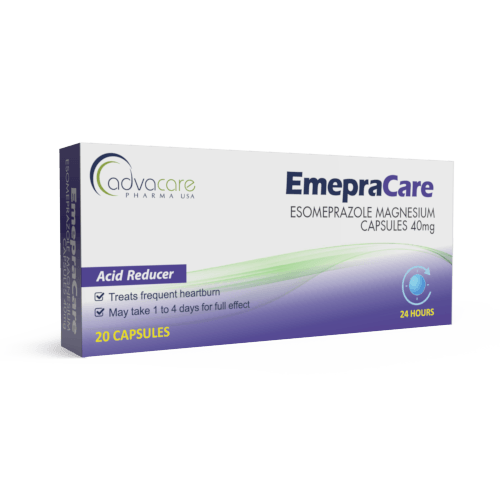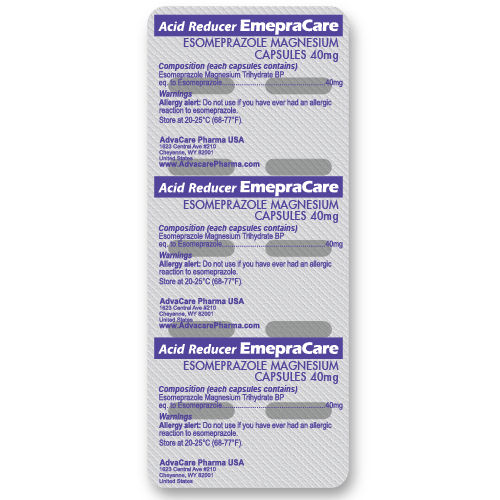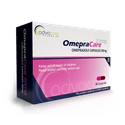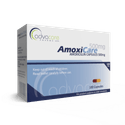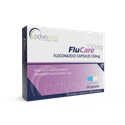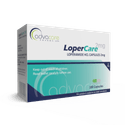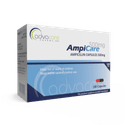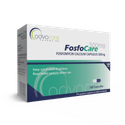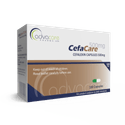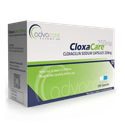- Home›
- Pharmaceuticals›
- Capsules›
- Esomeprazole Capsules
Esomeprazole Capsules
Dosage
Packaging
What is Esomeprazole?
Active Ingredients: Esomeprazole
Esomeprazole Capsules are medications used to decrease stomach acid production. They are used for the treatment of conditions caused by an excess of stomach acid, such as gastroesophageal reflux disease (GERD) and Zollinger-Ellison syndrome. They are effective in preventing peptic ulcers and reducing the risk of acid reflux recurrence.
Esomeprazole is also used in the prevention of gastric ulcers caused by Helicobacter pylori (H. pylori) bacterial infection or the excessive use of nonsteroidal anti-inflammatory drugs (NSAIDs) and to promote the healing of erosive esophagitis.
Esomeprazole is a small molecule in the class of medications called proton pump inhibitors (PPIs). It is the S-isomer of omeprazole and works by binding to sulfhydryl groups found on the H+/K+-ATPase enzyme to inhibit the production of gastric acid and prevent acid from being secreted into the stomach. PPIs typically take up to 4 days to reach full efficiency.
Since its inhibition of proton pumps is irreversible and new enzymes need to be expressed to resume acid secretion, the duration of esomeprazole's effects last longer than 24 hours.
This medication is produced and exported by AdvaCare Pharma. These Esomeprazole Capsules are manufactured in our facilities in China, India, and the USA. Our production factories comply with WHO guidelines and standards.
Why are we a quality Esomeprazole manufacturer?
AdvaCare Pharma is a GMP manufacturer of Esomeprazole Capsules. Our strategically located facilities ensure that our company has complete control over the supply chain, meaning higher quality products and lower costs for production, transportation and importation. Over the past 20 years, we have built a solid reputation as a leading Esomeprazole manufacturer, one of the 60+ products we manufacture in capsule dosage form, across 65 countries where our pharmaceutical products are distributed.
Uses
What is Esomeprazole used for?
Esomeprazole is indicated to reduce excess stomach acid for the following uses:
- Short-term treatment of heartburn resulting from gastroesophageal reflux disease (GERD)
- Eradication H. pylori bacteria for the prevention of duodenal ulcer recurrence
- Short-term treatment of gastric/peptic ulcers
- Short-term treatment of erosive esophagitis
- Long-term treatment of hypersecretory conditions, such as Zollinger-Ellison syndrome
Esomeprazole is also used to prevent ulcers and stomach irritation caused by the long-term usage of NSAIDs, like aspirin or ibuprofen. Esomeprazole is not intended for the immediate relief of heartburn symptoms.
How are Esomeprazole Capsules used?
This medication is manufactured to be taken orally. Esomeprazole Capsules should be taken with a full glass of water at least one hour before a meal. Do not crush or chew the capsule. If it cannot be swallowed, the capsule contents can be sprinkled into applesauce or pudding and swallowed without chewing.
What dose should be taken and how often?
Adults Recommended dosage may vary based on different medical conditions:
- Treatment of duodenal ulcers resulting from H. pylori infection in combination with antibiotics, the recommended dose is 40mg once daily for 10 days.
- Short-term treatment of GERD and its associated symptoms, the recommended dose is 20mg once daily for up to 4 weeks.
- Short-term treatment of erosive esophagitis, the recommended dose is 20-40mg daily for 4 to 8 weeks.
- Maintenance of healing of erosive esophagitis, the recommended dose is 20mg daily for length of treatment prescribed.
- Prevention of NSAID-induced gastric ulcer, the recommended dose is 20-40mg daily for up to 6 months.
- Long-term treatment of pathological hypersecretory conditions (e.g., Zollinger-Ellison syndrome), the recommended dose is 40mg twice daily.
Children (1 month - < 1 year) Short-term treatment of erosive esophagitis for up to 6 weeks, the recommended once-daily dose based on weight is 2.5mg (3-5kg), 5mg (5-7.5kg), and 10mg (> 7.5kg).
Children (1 - 11 years) Short-term treatment of GERD and its associated symptoms, the recommended dose is 10mg once daily for up to 8 weeks. Short-term treatment of erosive esophagitis for up to 8 weeks, the recommended once-daily dose based on weight is 10mg (< 20kg) and 10-20mg (≥ 20kg).
Children (12 - 17 years) Short-term treatment of GERD and its associated symptoms, the recommended dose is 20mg once daily for 4 weeks. Short-term treatment of erosive esophagitis, the recommended dose is 20 or 40mg once daily for 4 to 8 weeks.
The exact dosage is dependent on medical condition, response to the treatment, age, and weight. Refer to a doctor or pharmacist for more specific guidelines on dosage. Do not exceed what they advise.
Who can use Esomeprazole?
Esomeprazole can be administered to adults and children, but caution is advised for specific groups of patients.
Pregnant Studies on pregnant people taking esomeprazole are not adequate and cannot rule out any risk to the fetus. Current data do not suggest esomeprazole use during the first trimester can result in major congenital malformations or other adverse pregnancy outcomes.
Animal studies have not found evidence of teratogenic effects or fetal harm at therapeutic doses, however, changes in bone morphology were observed in animals taking exceedingly large doses (34x the normal dose). Due to the observed effect of high doses of esomeprazole, it should only be used during pregnancy if the potential benefit justifies the potential risk to the fetus.
Nursing Some data indicate that omeprazole, which has similar activity to esomeprazole, is excreted in low levels in breast milk making it likely that esomeprazole is also excreted into human milk. Caution should be exercised and consultation with a healthcare professional is required when considering taking esomeprazole while nursing, as its potential effects on nursing infants are unknown.
Pediatric The recommendations for dosage adjustments for children are as follows:
- In pediatric patients < 1 month old, esomeprazole’s safety and efficacy have not been established.
- In pediatric patients 1 month to < 1 year old, its safety and efficacy have been established for short-term treatment of erosive esophagitis.
- In pediatric patients 1 to 17 years old, esomeprazole’s safety and efficacy have been established for short-term treatment of GERD.
Geriatric Studies with adults ≥ 65 years old reveal no differences in safety and efficacy with esomeprazole use compared to adults < 65 years old. The increased sensitivity to medications in older patients should not be ruled out.
What are the main differences between Esomeprazole and Omeprazole?
Esomeprazole and omeprazole are both proton pump inhibitors (PPIs) used to treat conditions related to excess stomach acid. The primary distinction lies in their chemical structure, with esomeprazole being the S-isomer of omeprazole. Esomeprazole generally has higher bioavailability and a slightly longer duration of action. Clinical efficacy is similar for treating conditions like GERD and peptic ulcers, but individual responses may vary. While both medications are used for similar indications, omeprazole has been available in generic form for a longer time, making it often more cost-effective. The choice between the two should be made in consultation with a healthcare provider, considering factors such as individual response, side effects, and cost.
Other warnings
In patients with severe hepatic insufficiency, a maximum daily dose of 20mg should not be exceeded.
Concomitant use of medications that impact CYP2C19 or CYP3A4 activity, such as clopidogrel, St. John’s Wort, and rifampin, should be avoided.
Long-term omeprazole therapy has been connected to atrophic gastritis and cannot be ruled out with esomeprazole use.
PPI use has been associated with the development of new or exacerbated conditions, such as vitamin B12 deficiency, acute interstitial nephritis, C. difficile-associated diarrhea, osteoporosis-related fractures, cutaneous and systemic lupus erythematosus, and fundic gland polyps, in patients of all ages. Some events can be asymptomatic and may manifest weeks or years after continuous therapy. These conditions are typically associated with daily, long-term (≥ 1 year) esomeprazole use and may require treatment discontinuation. When administering PPIs, the lowest dose and shortest duration appropriate to the condition should be used to reduce the risk of adverse events related to prolonged use.
Rare cases of hypomagnesemia have been reported with the long-term use of PPIs (≥ 3 months) with adverse events including tetany, arrhythmias, and seizures. Magnesium levels should be monitored for those who are on long-term PPI treatment or are taking other medications that can cause hypomagnesemia. Hypomagnesemia may likely warrant PPI discontinuation.
Concomitant use of methotrexate and PPIs may increase methotrexate serum levels and increase the risk of methotrexate toxicity. High doses of methotrexate may likely warrant a temporary discontinuation of PPI therapy.
Side Effects
As with all pharmaceuticals, some unwanted effects can occur from the use of Esomeprazole Capsules.
Common side effects may include, but are not limited to:
- headache
- excessive gas
- dry mouth
- nausea
- diarrhea
- drowsiness
Seek medical attention if the following develop:
- chest pain that radiates to the jaw or shoulder, as these can be symptoms of a heart attack
- flu-like symptoms
- rash, hives, or itching
- irregular or fast heartbeat
- seizures
- joint pain
- severe diarrhea or persistent stomach pain
- loss of appetite
- fever
- changes in urination
For a comprehensive understanding of all potential side effects, consult a medical professional.
If any symptoms persist or worsen, or you notice any other symptoms, please call your doctor immediately.
Precautions
Do NOT use Esomeprazole Capsules if:
- You have an allergy or hypersensitivity to esomeprazole or similar medications, such as omeprazole.
- You have stomach cancer.
- You have severe kidney damage.
- You have severely decreased liver function.
- You have osteoporosis.
- You are breastfeeding.
Prolonged use of proton pump inhibitors (PPIs) like esomeprazole has been associated with a slight increase in the risk of bone fractures, particularly in the hip, wrist, and spine.
Possible interactions may occur with other pharmaceutical products including prescription drugs, over-the-counter medications, and supplements. Consult with a doctor or pharmacist about any medications and supplements you are taking before beginning treatment.
References
Safety and Efficacy of Long Term Esomeprazole Therapy in Patients with Healed Erosive Oesophagitis
This study focused on evaluating the safety and tolerability of long-term treatment with esomeprazole in patients with healed erosive oesophagitis. It is a multicentre, noncomparative, nonblind study that included 807 patients with endoscopically confirmed healed erosive oesophagitis. The patients received 40mg of esomeprazole daily for up to 12 months and during the treatment, adverse events, clinical laboratory tests, endoscopy, and gastric biopsies were performed.
During the study 80.9% of patients completed 6 months of treatment; 76.6% completed 12 months of treatment, while less than 3% of the patients showed adverse effects like gastrointestinal side effects and headaches. The gastric biopsy showed a decline in chronic inflammation and atrophy. The maintenance of healing was 93.7% [95% confidence interval (CI) 92.0 to 95.5%] at 6 months and 89.4% (95% CI 87.0 to 91.7%) at 12 months.
The conclusion of this research is that daily treatment with esomeprazole in patients with healed erosive oesophagitis is well-tolerated and effective.
Esomeprazole-based therapy in Helicobacter pylori eradication: a meta-analysis
This meta-analysis included a systematic review of the efficacy of esomeprazole in the treatment of Helicobacter pylori compared to other proton pump inhibitors. Four studies were included and it was found that esomeprazole plus antibiotics in the treatment of Helicobacter pylori were 86 and 82% (odds ratio=1.19; 95% confidence interval=0.81–1.74).
The conclusion is that esomeprazole is highly effective for the eradication of H. pylori infection.

You might be interested in...
Why AdvaCare Pharma?
As an industry leader, we are aware of our responsibility to provide affordable and sustainable solutions to improve healthcare worldwide.
